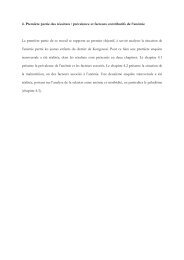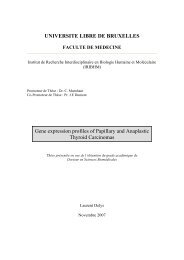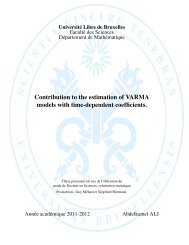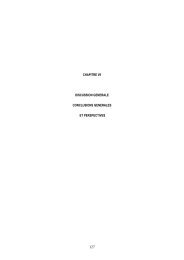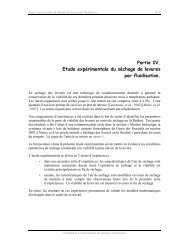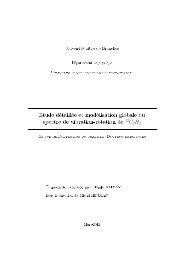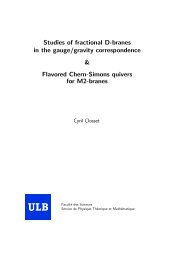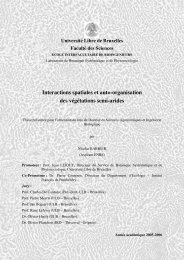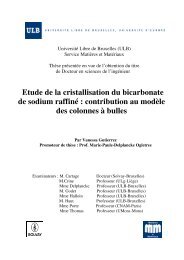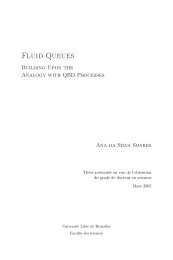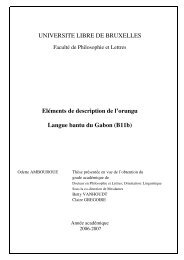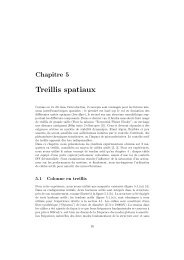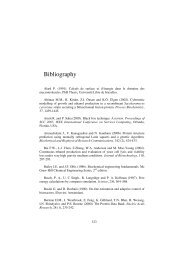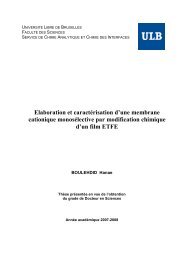Chapitre IIIprobably because the size range (41–66 mm ray length) was narrower than in the fieldstudy (17–105 mm ray length) and thus impe<strong>de</strong>d to <strong>de</strong>tect an effect.Salinity effect on Mg/Ca ratioUn<strong>de</strong>r experimental conditions, when a wi<strong>de</strong> range of salinity was used, a clear salinityeffect on the Mg/Ca ratio was evi<strong>de</strong>nced in A. rubens. The salinity <strong>de</strong>pen<strong>de</strong>nce was linearand accounted for 0.94–1.69 (mmol/mol)/psu, i.e., ~1% to ~1.5%/psu. These values are ofthe same magnitu<strong>de</strong> as the temperature effect on the echino<strong>de</strong>rm skeleton Mg/Ca ratio,i.e., ~2%/°C (Chave 1954). This result is in contradiction with Richter & Bruckschen’s(1998) field results. In their study, specimens were collected in very contraste<strong>de</strong>cosystems (Kattegat, North Sea, Atlantic, and Mediterranean), showing different rangesof seawater temperature that correlated with salinity. We suggest that, in the latter case,the salinity effect was masked by the temperature effect and possibly by signatures ofdifferent water masses.The salinity effect reported in the present study was not due to differences in growth rate<strong>de</strong>pending on salinity. As seawater Mg/Ca ratio showed no relation with salinity (seesection on Material and Methods), such an effect can also be ruled out. Differences in Mgand Ca transport or homeostasis according to salinity could be involved. A. rubens is anosmoconformer, its perivisceral and ambulacral fluids being isosmotic and isoionic withseawater, except for Ca and K, which are regulated (Binyon 1962, Stickle & Diehl 1987).If calcium uptake is at least partly controlled, magnesium concentration in inner fluidswould vary more than calcium ones with seawater concentrations and, thereby, withsalinity. As a consequence, the Mg/Ca ratio of inner fluids would be lower at lowersalinities. In vitro, the Mg/Ca ratio of highly supersaturated solutions was <strong>de</strong>monstrated to<strong>de</strong>fine the magnesium content of the resulting amorphous calcium carbonate (ACC)precipitate both in the absence and presence of organic matrix-like macromolecules (Razet al 2000, Loste et al 2003, Cheng et al 2007, Gayathri et al 2007). Subsequently, ACCcontaining more Mg crystallized to yield calcites with higher Mg concentrations.Therefore, if in vivo mechanisms (which also inclu<strong>de</strong> a transient ACC phase) follow thesein vitro processes, the differential regulation of Mg and Ca could be responsible for theobserved effect. Alternatively, salinity could induce a modification in the composition orabundance of the intraskeletal organic matrix, which was suggested to control the Mgcontent of the echino<strong>de</strong>rm skeleton (Dubois & Chen 1989). Such a hypothesis was70
Chapitre IIIalready proposed by Van<strong>de</strong>r Putten et al (2000) to account for seasonal variations in theMg content of Mytilus edulis calcite shell layer. Acidic organic macromolecules stabilizein vitro the transient ACC phase (Raz et al 2000) and possibly play an important role inthe hydration of this phase, allowing an easier incorporation of the Mg ion, which has arelatively large <strong>de</strong>hydration barrier (Cheng et al 2007). Furthermore, Robach et al (2006)<strong>de</strong>monstrated that higher Mg concentrations in the sea urchin tooth were linked to matrixmolecules richer in aspartic acid. Thus, one may hypothesize that more acid matrixmolecules will, in vivo, further stabilize the transient ACC phase, allowing for a higherincorporation of Mg.Using Ries’ (2004) algorithms we reconstructed seawater Mg/Ca ratio and the errorinduced by the salinity effect on the calcite Mg/Ca ratio. This induced an error in <strong>de</strong>ducedseawater Mg/Ca ratio between 2% and 5% at a difference of 1 psu and between 16% and46% for a difference of 10 psu (Figure 26), according to the seawater Mg/Ca ratio. Thehighest error occurs for the lowest seawater Mg/Ca ratio of 1.29, i.e., values inferred for apart of the Phanerozoic oceans (see e.g., Dickson 2002).This result emphasizes the need to consi<strong>de</strong>r the salinity effect, with the temperature effect,when reconstructing long-term changes (Δt > 1 m.y.) in the seawater Mg/Ca ratio.Figure 26: Impact (%) of the salinity effect on the seawater Mg/Ca ratio reconstruction based on Ries’(2004) algorithms (Mg/Ca skeleton =(0.0471×Mg/Ca SW 0.668 )71



